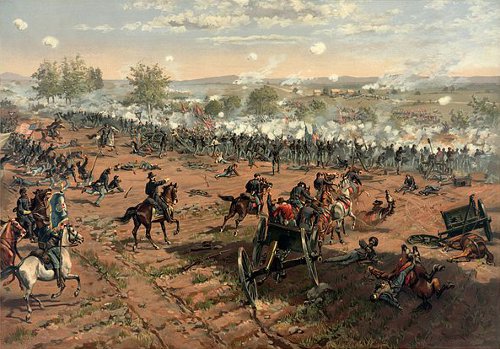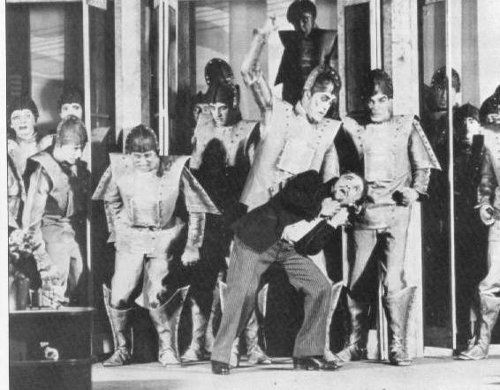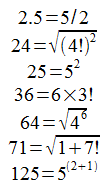
scripturient
adj. having a desire for writing or authorship

scripturient
adj. having a desire for writing or authorship
The Lord is my Shepherd; my wants are a’ kent; the pasture I lie on is growthie and green.
I follow by the lip o’ the watirs o’ Peace.
He heals and sterklie hauds my saul: and airts me, for his ain name’s sake, in a’ the fit-roads o’ his holiness.
Aye, and though I bude gang throwe the howe whaur the deid-shadows fa’, I’se fear nae skaith nor ill, for that yersel is aye aside me; yere rod and yere cruik they defend me.
My table ye hae plenish’t afore the een o’ my faes; my heid ye hae chrystit wi’ oyle; my cup is teemin fu’!
And certes, tenderness and mercie sal be my fa’ to the end o’ my days; and syne I’se bide i’ the hoose o’ the Lord, for evir and evir mair!
— William Wye Smith, The New Testament in Braid Scots, 1904
A common error resulting from bad penmanship is the substitution of letters for figures, or the reverse: thus, in the report of a coal-market, where the writer intended to say that there was an over-supply of egg size, the types laid that there was an over-supply of 299; similarly, where a writer described a house with zigzag staircases, he was made to give it the extraordinary number of 219,209 staircases. In an obituary notice of Sidney Godolphin Osborne, the London Times described him as the author of the celebrated tract ‘No Go,’ when what the writer meant was the tract No. 90. But no similar excuse can be urged for the printer who made Tennyson’s famous lines read,–
Into the valley of death
Rode the 600.
— William Shepard Walsh, Handy-Book of Literary Curiosities, 1909
For any four consecutive Fibonacci numbers a, b, c, and d, ad and 2bc form the legs of a Pythagorean triangle and cd – ab is the hypotenuse.
(Thanks, Katie.)

Meade brought his troops to this place where they were to win or lose the fight. At noon all was in trim, and at the sign from Lee’s guns a fierce rain of shot and shell fell on both sides. For three hours this was kept up, and in the midst of it Lee sent forth a large force of his men to break through Meade’s ranks. Down the hill they went and through the vale, and up to the low stone wall, back of which stood the foe. But Lee’s brave men did not stop here. On they went, up close to the guns whose fire cut deep in their ranks, while Lee kept watch from the height they had left. The smoke lifts, and Lee sees the flag of the South wave in the midst of the strife. The sight cheers his heart. His men are on the hill from which they think they will soon drive the foe. A dense cloud of smoke veils the scene. When it next lifts the boys in gray are in flight down the slope where the grass is strewn thick with the slain. … Oh, that there were no such thing as war!
— Josephine Pollard, The History of the United States Told in One-Syllable Words, 1884
brabble
v. to quarrel about trifles

DR. GALL: You see, so many Robots are being manufactured that people are becoming superfluous; man is really a survival. But that he should begin to die out, after a paltry thirty years of competition! That’s the awful part of it. You might think that nature was offended at the manufacture of the Robots. All the universities are sending in long petitions to restrict their production. Otherwise, they say, mankind will become extinct through lack of fertility. But the R.U.R. shareholders, of course, won’t hear of it. All the governments, on the other hand, are clamoring for an increase in production, to raise the standards of their armies. And all the manufacturers in the world are ordering Robots like mad.
HELENA: And has no one demanded that the manufacture should cease altogether?
DR. GALL: No one has the courage.
HELENA: Courage!
DR. GALL: People would stone him to death. You see, after all, it’s more convenient to get your work done by the Robots.
HELENA: Oh, Doctor, what’s going to become of people?
DR. GALL: God knows, Madame Helena, it looks to us scientists like the end!
— From Karel Čapek’s 1920 play R.U.R., which introduced the word robot

In the minuet in Haydn’s Symphony No. 47, the orchestra plays the same passage forward, then backward.
When Will Shortz challenged listeners to submit word-level palindromes to National Public Radio’s Weekend Edition Sunday in 1997, Roxanne Abrams offered the poignant Good little student does plan future, but future plan does student little good.

And Connecticut’s Oxoboxo River offers a four-way palindrome — it reads the same forward and backward both on the page and in a mirror placed horizontally above it.
opuscule
n. a musical or literary work of small size
In 1965 poet Aram Saroyan wrote a poem consisting of a single word, lighght. George Plimpton included it in the American Literary Anthology, and Saroyan received a $500 cash award from the National Endowment for the Arts.
Perhaps to mock this, in 1972 Dave Morice published Matchbook, a literary magazine whose inch-square pages were stapled inside working matchbooks. Edited by the fictional Joyce Holland, each issue featured nine one-word poems submitted by contributors. Examples:
apocatastasis (Allen Ginsberg)
borken (Keith Abbott)
cerealism (Fletcher Copp)
cosmicpolitan (Morty Sklar)
embooshed (Cinda Wormley)
gulp (Pat Paulsen)
Joyce (Andrei Codrescu)
meeeeeeeeeeeeee (Duane Ackerson)
puppylust (P.J. Casteel)
sixamtoninepm (Kit Robinson)
underwhere (Carol DeLugach)
zoombie (Sheila Heldenbrand)
The longest submission, Trudi Katchmar’s whahavyagotthasgudtareedare, appeared as a fold-out.
Drear fiend: How shall this spay be dent?
I jell you no toque — I do not know.
What can I do but snatch the woe
that falls beyond my pane, and blench
my crows and ted my briny shears?
Now galls another class. I’ll sit
and eye the corm that’s fought in it.
Maces will I fake, and heart my pare.
Is this that sold elf that once I was
with lapped chips and tolling lung?
I hollow sward and tight my bung
for very shame, and yet no cause —
save that the beery witchery
of Life stows grail. Shall I abroad?
Track up my punks? Oh gray to pod
for him who sanders on the wee!
I’ll buff a stag with shiny torts
and soulful hocks, a truthbush too,
perhaps a rook to bead — but no!
my wishes must be dashed. Reports
of danger shake the reaming scare.
Whack against blight! Again that tune,
“A gritty pearl is just like a titty prune”
blows from the fox. I canot bear
this sweetness. Silence is best. I mat
my mistress and my sleazy lumber.
I’ll shake off my toes, for they encumber.
What if I tub my stow? The newt
goes better fakèd to the cot.
I’ll hash my wands or shake a tower,
(a rug of slum? a whiskey sour?)
water my pants in all their plots,
slob a male hairy before I seep —
and dropping each Id on heavy lie,
with none to sing me lullaby,
slop off to dreep, slop off to dreep.
— Robert Morse, quoted in W.H. Auden’s commonplace book A Certain World